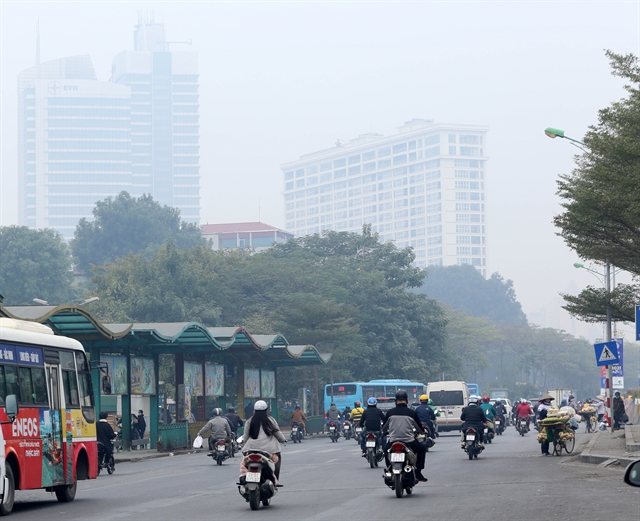 Environment
Environment

Air quality in the capital city fell to dangerous levels in the first week of the New Year, particularly in inner city areas, according to the Department of Natural Resources and Environment.

|
| Thick haze blankets Hà Nội in early January. — VNA/VNS Photo |
HÀ NỘI — The US’s experience in environmental management and air quality control in Việt Nam were touched upon at a seminar in held earlier this week.
The event, themed “Solving the air quality crisis: from the US to Việt Nam,” was jointly arranged by the US Agency for International Development (USAID), the environmental protection agency under the Hà Nội Department of Natural Resources and Environment, and the Live & Learn Centre.
Dr. Lý Bích Thủy from the Hanoi University of Science and Technology pointed out the harmful impact of air pollution on human health and life, and called for joint efforts to find suitable measures to tackle the problem.
Lê Thanh Thủy, from the environmental protection agency, said given environmental challenges, Hà Nội has increased investment in waste control and treatment.
Eric Wolvovsky, an expert from the US Bureau of Ocean Energy Management, introduced the US’s adequate and strict policies and laws on environmental protection.
Air quality in the capital city fell to dangerous levels in the first week of the New Year, particularly in inner city areas, according to the Department of Natural Resources and Environment.
The air quality index (AQI) figures have been reported to the municipal People's Committee who are working with agencies to identify the causes of the pollution and for measures to improve air quality.
Results from 35 air quality monitoring stations in the city showed that the AQI tended to increase from January 1, and rose sharply on the morning of January 5, hitting the peak warning level of 5/6.
From December 29 to December 31, 2020, most of the stations showed that the AQI was good or medium levels.
However, from January 1, 2021, air quality tended to drop sharply, some locations including the Environmental Protection Department, the People's Committee of Minh Khai Ward, and the French Embassy.
Prime Minister Nguyễn Xuân Phúc has asked ministries and People’s Committees of centrally-run cities and provinces to step up the implementation of programmes and tasks on air quality control.
The move aims to intensify the control of air pollution, ease its impact on people’s health and spur socio-economic development.
In a recently-issued directive, the Government leader emphasised the need to review law enforcement and the control of dust and emissions at industrial facilities as well as from transport and construction activities.
He also ordered the suspension of the facilities that cause serious environmental pollution.
The PM asked the Ministry of National Resources and Environment to assess the realisation of the decision dated June 1, 2016, approving the national action plan on air quality control by 2020, with a vision towards 2025, and the proposal on air quality control plans for the next five years. — VNS




